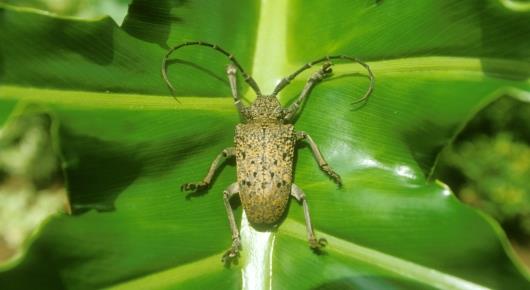FAO shepherds region-wide cooperation on forest invasive species

When the health, biodiversity, or even long-term survival of forests is at risk, the culprit is not always logging, road-building or urban sprawl. Increasingly, forest invasive species are spreading and damaging trees and forests worldwide.
A three-day international meeting convened by FAO has brought experts to Budapest this week from 26 different countries. They will be discussing intensively spreading forest mammals, exotic parasites, urban forestry, whether the spread of the golden jackal is driven by the search for food or by climate change, and much more.
An invasive species is a plant, fungus, or animal species that is not native to a location and that has a tendency to spread to a degree that causes environmental damage and other problems.
Today, many of these species are spreading at a faster pace or breaking into areas where they have never been seen before. Climate change and intensifying global trade are among the contributing factors, according to FAO.
“Unfortunately, the Europe and Central Asia region is not an area free from such invasive species,” said FAO forestry officer Norbert Winkler-Ráthonyi. “Invasive insects in particular are damaging forests here.”
Damage usually starts in a small territory, but can easily intensify and spread to large forested areas. Forests and trees in urban and protected areas, including virgin forests, can be affected.
FAO is active on several fronts to better monitor such insects – such as the pine processionary moth in Albania.
During this week’s meeting, the experts plan to constitute a new Forest Invasive Species Network for Europe and Central Asia, supported by FAO.
“Through this new Network we can reach more countries, more experts, and can trigger region-wide cooperation on forest invasive species management,” Winkler-Ráthonyi added.
The Network will facilitate information exchange, mobilize resources, and raise awareness about forest invasive species. Through it, experts, institutions, scientific groups and others will connect with one another.
The experts are expected to discuss a work plan for the coming year, as well as communication and awareness raising efforts. Making decision makers, forestry professionals and the public aware of the rapid movement of forest invasive species and the threat to natural resources is considered crucial.
The meeting started with a hands-on look at the bark and ambrosia beetles that are one of the main infesters of pine trees in Europe and Central Asia.
Similar expert networks already exist for Africa, Asia-Pacific, the Near East, and South-America.
Participating countries are: Armenia, Austria, Azerbaijan, Belarus, Bosnia and Herzegovina, Bulgaria, Croatia, Czech Republic, France, Georgia, Hungary, Latvia, Moldova, Norway, Poland, Romania, Russian Federation, Serbia, Slovakia, Slovenia, Spain, Sweden, Tajikistan, Ukraine, Uzbekistan.
Budapest, Hungary, 18 October 2017
